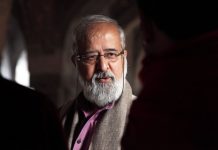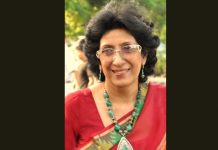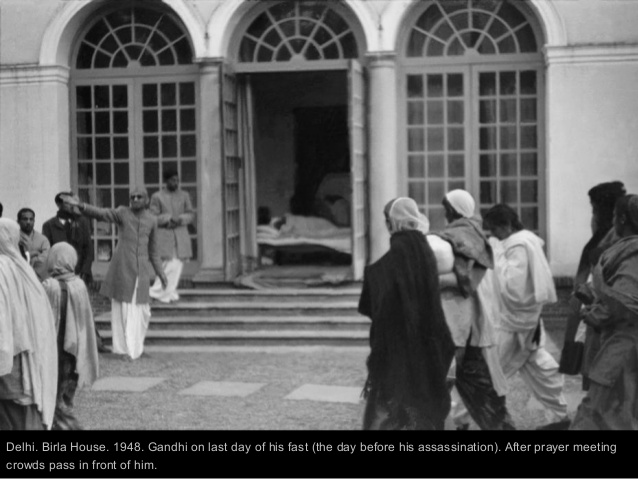- Generally, we see that what is being taught at our universities in the name of social theories is primarily western in origin. Is it because of our colonial legacy? Or is it that western social theories have been projected as ‘universal’?
This is a complex question that I would like to answer at three levels. Our colonial legacy is certainly at issue here and it is always worth remembering that colonialism implanted an entirely different system of knowledge where the rupture involved huge levels of violence. This is most evident at the level of statecraft and the new legal regime that is put in place, for it is at that level that the violence is felt in a most generalized way across different sections of the population. Almost overnight, people were subjected to notions of crime and criminality that were developed elsewhere, about which they therefore had no clue. Or take something like the Land Acquisition Act 1894, which has provided the legal basis of the dispossession of adivasis and peasants from their land till the 2013 amendment was passed in the face of massive popular struggles. So yes, the colonial legacy is certainly one crucial aspect and that is the first level. The second level is also already contained in your question – the fact that western social theory or political theory and philosophy are routinely projected as ‘universal’ but this is not as trivial a question as it might sound today. The universalist ambitions of modern social and political theory gain legitimacy from it origins in the context of struggles in Europe against the hierarchies and power of particularisms of all kinds, including those of different religious denominations. And this level is very intimately tied to the third level – that of the rise of modernity itself. That modernity as we understand it, first arose in a specific context in Europe and then spread across the world, has a lot to do with it. Different elements out of which ‘modernity’ was assembled, of course have much longer histories that go back to different parts of the world but Europe’s distinctive contribution was the idea of the abstract equality of individuals and the discourse of rights – with the individual as the bearer of rights. This was something entirely new and it was very seductive even for colonized populations who were not only struggling against indigenous discriminations of various kinds but also fighting the colonizers. So the appeal of this new philosophical vision was very powerful across different parts of the world and contributed, in no small measure, to the universalization of modern western social and political philosophy. It was almost as if its abstract nature could simply make it implantable in different contexts.
- How do you locate postcolonial theories? Do you feel that even postcolonial theories have been appropriated by Euro- American universities? Is it then yet another conceptual battle among intellectual elites?
Actually postcolonial theory was born in the Euro-American academy and the work of the émigré Palestinian scholar Edward Said was critical in opening up the space for it. In the decades since, postcolonial theory has had a major impact in terms of providing excellent critiques of Western knowledge and its modes of domination so much so that today no Western university can continue to pretend as if all thought happens or happened only within its precincts and under its tutelage. The sea change that we see today in this regard has been possible thanks to the interventions of postcolonial theory as much as it has been made possible by important work emerging from other locations outside the West. We cannot really say that postcolonial theory was appropriated by the Euro-American academy since it was produced there. Nor can we say that it has been appropriated by dominant western knowledge as the latter has faced its biggest challenge till date, precisely from this quarter. I should also make it clear that all – I repeat all – knowledge and theoretical activity is what you call a ‘conceptual battle among intellectual elites’. Those who claim to speak on behalf of the proletariat or of any other oppressed group also do just that – engage in battles among elites. What can legitimately be said about postcolonial theory by way of criticism is that being largely a product of the diasporic intelligentsia’s interventions, it has not really managed to – or even tried to – mine other intellectual traditions from outside the West. Certainly not in epistemological terms, that is to say, by positing other ways of knowing and elaborating their principles.
- How do you read the works of Ashis Nandy, Partha Chatterjee and Gayatri Chakrabarty Spivak in this context?
The work of both Ashis Nandy and Partha Chatterjee has been quite critical for those working in Indian universities and research institutions insofar as their work has opened up possibilities of doing theory without looking up to the West at every step. They are both very different in their approaches and while Partha Chatterjee has continuously tried to theorize the Indian and non-Western experience of modern politics and democracy, while still relying on the conceptual paraphernalia provided by Western theory, Nandy is a very different kind of thinker. Though trained in psychology and in the Western tradition, he has taken the route of approaching the lived conceptual universe of South Asians through popular culture, myths/ mythology and even popular cinema. Through these he attempts to specify a different way of being and knowing which is sometimes characterized as South Asian and sometimes as nonmodern. Though he does not theorize these modes of knowing and being, he certainly sketches them for us, his readers. And I suspect, if pushed on this issue, he might say ‘theorizing’ is not our (‘South Asian’) mode of knowledge production. As for Gayatri Spivak, she is and remains an important voice of postcolonial theory and is obviously one of the key figures in establishing the field of postcolonial studies. But I cannot comment on her work because I have not really engaged with it, largely because her concerns seem too distant from mine. I also do not relate to that mode of doing theory, which is primarily textual and because of its location, addresses the concerns of knowledge and power as they are encountered by the diasporic intelligentsia.
- As in India we are seeing all sorts of violence in the name of caste and religion, modernists are likely to plead for their cause. In this context, do you feel that the ‘ postmodern’ smell of postcolonial theories might be critiqued by,say, Marxist intelligentsia?
This is a far more complicated question than it appears. We could begin by asking the question in reverse. ‘Modernism’ did not prevent anti-Semitism and fascism from engulfing Europe in the nineteenth and a large part of the twentieth century. Nor has it prevented the worst kinds of racism from running right through the history of modernity – both in colonized societies as well as in their own. Today, America’s and Europe’s crisis is not just because of the immigrants from Asia or Africa trooping into their societies but is tied to a very clear tendency of white supremacism that is running amok. And when we look at our own societies, we should be clear that religious sectarian or communal violence starts manifesting in the specific way we are now familiar with, from the nineteenth century and, as a lot of scholarship now shows, is linked to colonial governmentality and its modern practices like enumeration of populations. Just to give an example, before the 1881 census in Bengal, there was no idea of how many of the Bengalis were Hindus and how many Muslims. Muslims being largely among peasant converts, were hardly visible to the naked eye of the culturally dominant bhadralok. It was the census that showed that Muslims were actually marginally more in number – 51 percent – in the aggregate population of the then Bengal. Panic buttons were pressed and suddenly in the next few decades, tracts like Colonel U.N. Mukherjee’s Hindus – A Dying Race started being produced, which initiated a politics of fear (‘Muslims will outnumber Hindus’) that flourishes to this day. The question of majority and minority was also not a question that ever concerned non-moderns. This is a question that becomes relevant with the emergence, first of nationalism and the need to define it in terms of its ‘ancient greatness’ and ‘antiquity’ when the Nation was supposedly ‘pure’. Thereafter, the advent of democracy led to the search for permanent cultural majorities and identification of ‘treacherous’ minorities. So to lay the blame of everything at the door or premodern and nonmodern practices and to present the ‘modern’ as the panacea is highly simplistic, if not disingenuous. Now in the case of violent caste practices like untouchability, modern ideas and institutions have played an important role. These forms of discrimination have existed in the past and the Dalits and other lower castes who wished to revolt against them found an ally in the colonial government as well intellectual resources in the discourse of rights and equality as I have indicated above. So my answer is that it is not just a simple matter of choosing between the one and the other but contextually deciding on what seems best and how best to go about the business of social transformation. Such an insistence on the contextual and culturally-historically specific nature of different forms of oppression or hierarchies of power and therefore a suspicion of metanarratives (and universalist answers) is what is generally designated as ‘postmodernism’. Marxism, on the other hand, insists on reducing everything to the universalist category of ‘class’ and an effect of ‘the economy’ (capitalism). This leads to its continuing philosophical difficulties in recognizing patriarchy or caste or race as distinct from and autonomous of ‘class’ or the economy. The blame for their repeated failure to see and understand caste and patriarchy cannot be laid at the door of postmodernism. In fact, the inability to understand Indian society on its own terms, to understand the all-pervasiveness of ‘caste’ and not reduce it to ‘class’, is to an extent what decolonization of thought is all about.
- At this juncture, we would like to know about your own politico- intellectual trajectory, and your recent works.
Well, I started life as a full time activist of the CPI(M) and remained a passionate Marxist for some years even after I left the party in 1992. The timing of my leaving is crucial to understanding my subsequent trajectory. The years 1989-1992 were tumultuous both in India and globally. In India the campaign for the demolition of Babri Masjid had begun in 1989 and was followed by massive bloodbath all along the route of LK Advani’s Rath Yatra. And while all this was going on, the VP Singh government implemented the Mandal Commission’s provisions – and all hell was let loose with upper caste youth coming out in absolute hatred for the Dalits and OBCs. Then came the demolition of the mosque. It became clear that suddenly the Left parties had nothing to say to ordinary people and were reduced to the role of bystanders. Globally, this was the time of the fall of the Berlin wall and then the disappearance of the Soviet Union from the map of the world. And so when neoliberal reforms started with the Structural Adjustment Programme in 1991, the Left was so demoralized that it had no capacity to make any credible critique of it. The most powerful critiques of neoliberalism in those years came from the struggles against mass dispossession, especially the Narmada Bachao Movement. None of these actually sat well with the Marxist understanding of history, historical development and capitalism. So these became the questions that have preoccupied me intellectually ever since. My first book, The Insurrection of Little Selves: The Crisis of Secular-Nationalism in India was an attempt to think through the caste (especially Dalit) question and the religious/ communal question through the crisis of Nehruvian/ Marxist secular-nationalism. It arose as a response to the theoretical questions posed by the Mandal and Babri Masjid crises. Another of my books, Desire Named Development, was an attempt to conceptually question notions of the inevitability of Development and Capitalism, from the vantage point of mass displacement of adivasi and peasant populations.
My most recent book Decolonizing Theory: Thinking across Traditions in a way comes as the culmination of one phase of that journey. Thinking about caste, ‘secularism’ or capitalism, the ‘political’ and so on obviously led to the question of modernity itself. The point of departure for this book was basically the realization that, according to the received wisdom of Western social and political theory, four-fifths of the world was always ever doing everything wrong! They were not modern enough, their secularism was flawed, their democracies were always immature – even their capitalism was retarded. Basically it was a case of making an elephant climb a tree and then saying poor fellow, he is fat or slow or ungainly and so on. Increasingly, it became clear that this was a problem of the West setting itself up as the norm and the model for every other society to follow, regardless of their own histories and their own trajectories. So, in a fundamental sense, the point was to step aside from this frame and find resources for thinking differently. Fortunately, there is now a fairly large body of work that can form the basis of such an exercise and that is what I have tried to do in this book.
Aditya Nigam is Professor at the Centre for the Study of Developing Societies(CSDS), Delhi.














